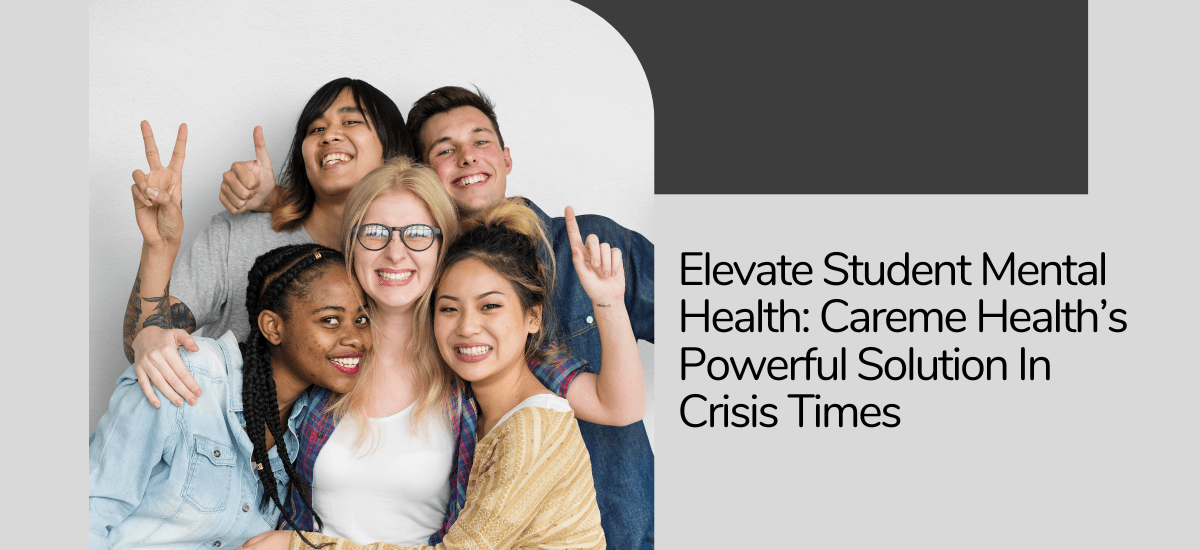Elevate Student Mental Health: Careme Health’s Powerful Solution In Crisis Times

Introduction
In recent years, the mental well-being of young students has become a major public health concern. Reports of rising anxiety, depression, and, most alarmingly, suicidal thoughts among students have caught global attention. The dire need for early, effective, and accessible mental health intervention is crystal clear. Highlighting this need is Careme Health, a pioneering mental health startup from India incubated at IITM.
The Alarming Stats
The World Health Organization states that approximately 800,000 people succumb to suicide annually, with countless others attempting. The youth demographic, particularly students, is disproportionately affected. Factors such as academic pressure, peer relationships, family conflicts, and the inherent stress of young adulthood exacerbate potential risks.
Why Traditional In-House Therapy Might Not Be Enough
Numerous educational institutions have adopted in-house therapist or counseling systems. However, there remain glaring deficiencies:
- Limited Expertise: Not all in-house counselors possess specialization in diverse mental health domains, restricting their scope of effective treatment.
- Accessibility Issues: Given the vast student populations, a few counselors can hardly address the mental health needs of all.
- Stigma and Privacy Concerns: The looming fear of being judged prevents students from seeking help, worried their struggles might leak into public forums.
Why Careme Health is the Game-Changer
Bridging these gaps, a dedicated organization like Careme Health offers an advanced approach to student mental health:
- Diverse Expertise: With its robust team of 40 professionals, Careme Health extends holistic mental health solutions, addressing everything from anxiety and depression to more severe conditions.
- Multilingual Support: Removing linguistic barriers, Careme Health offers therapy in 15 languages, fostering uninhibited communication.
- Digital Accessibility: Their innovative mobile and web applications enable students to avail therapy remotely, obviating the need for physical visits. To book a demo of the app, click here.
- Evidence-Based Care: Stressing on scientifically backed therapies ensures that students receive proven mental health treatments.
The Role of Evidence-Based Therapy
Evidence-based practices, like Cognitive Behavioral Therapy (CBT), Dialectical Behavior Therapy (DBT), etc., have established their efficacy in mitigating diverse mental health challenges. These modalities:
- Offer focused, short-term solutions, ideal for the bustling lives of students.
- Arm students with actionable strategies to regulate their thoughts, emotions, and actions.
- Provide quantifiable results, facilitating transparent progress tracking for both therapists and students.
The Path Ahead: Elevating Mental Health Standards
Merging Careme Health’s solutions with educational structures can redefine mental health care for students. By granting immediate access to specialized support, timely interventions become a reality.
Furthermore, an external service provider enhances confidentiality, potentially increasing the likelihood of students seeking help. If you’re looking for direct interaction with a therapist, book an instant appointment here. The potential impact? Diminished academic pressure, improved interpersonal connections, enhanced overall mental health, and a potential downturn in student suicides.
Conclusion
Given the escalating mental health challenges confronting students, traditional care models warrant reconsideration. Collaborations between academic entities and specialized units like Careme Health promise a holistic, effective, and user-friendly remedy.
Colleges bear an intrinsic duty to their students. By assimilating avant-garde mental health mechanisms, they can pave the way for a more secure, wholesome, and promising future for the younger generation.
Related Articles

Letting Go With Grace: Emotional Tools for Closure
Letting go is never easy. Whether we are parting ways with a loved one, ending a relationship, leaving a job, or saying goodbye to a cherished chapter of life, the emotional weight can feel overwhelming. Yet, closure is essential for our emotional well-being. Without it, we carry unresolved grief, anger, regret, or longing that can seep into new relationships and experiences, holding us back from healing and growth.

Breakup Blues: How to Cope and Rebuild Your Self-Worth
A breakup often feels like a silent earthquake—unseen by others but devastating within. The pain doesn’t just come from the loss of a relationship, but from the crumbling of the life, identity, and future you built with another person. You may find yourself questioning your worth, doubting your value, and feeling isolated even when surrounded by people. In Indian society, where emotional expression is often discouraged and breakups can be stigmatized, this pain may feel even more overwhelming. But the truth is—while breakups may shake you, they do not define you. You are not broken; you are in a process of emotional reformation. And with the right tools, guidance, and support system, you can rebuild not just your self-worth but also your entire life narrative.

Healing After Heartbreak: A Mental Health Perspective
Heartbreak doesn't just break your heart—it can shatter your sense of identity, peace, and purpose. Whether the end was expected or abrupt, mutual or one-sided, short-lived or long-term, the aftermath often leaves people emotionally disoriented. In Indian culture, where societal expectations and family involvement in romantic relationships are prevalent, the pain is not just personal—it is public. Yet, very few are taught how to heal from emotional loss in a healthy, sustainable way.

Boundaries in Love: Saying ‘No’ Without Guilt
Love, in its truest form, should be a safe space—a space where individuality is not only respected but celebrated. Yet, in many relationships, especially in the Indian cultural context, love is often misunderstood as constant availability, complete sacrifice, and putting the other person first, always. As noble as this may sound, this version of love often leads to emotional exhaustion, suppressed resentment, and the erosion of one’s identity.

Gaslighting in Relationships: What It Is and How to Heal
Gaslighting is a form of emotional abuse that erodes your ability to trust your own perception. It’s a slow, insidious process that often begins with subtle doubts and ends with complete self-questioning. In romantic relationships—especially in the Indian context where silence, compromise, and duty are often mistaken for love—gaslighting can be even harder to recognize.

How Depression Can Affect Your Relationship—And What You Can Do
Depression is not just an internal struggle—it ripples outward, affecting relationships, routines, and the emotional fabric that holds people together. When someone is dealing with depression, it's not only their world that becomes dim—it can cast a shadow over their most intimate connections too. In a country like India, where open conversations about mental health are still rare and love is often equated with endurance, depression within a relationship can become invisible, misunderstood, or misjudged.
